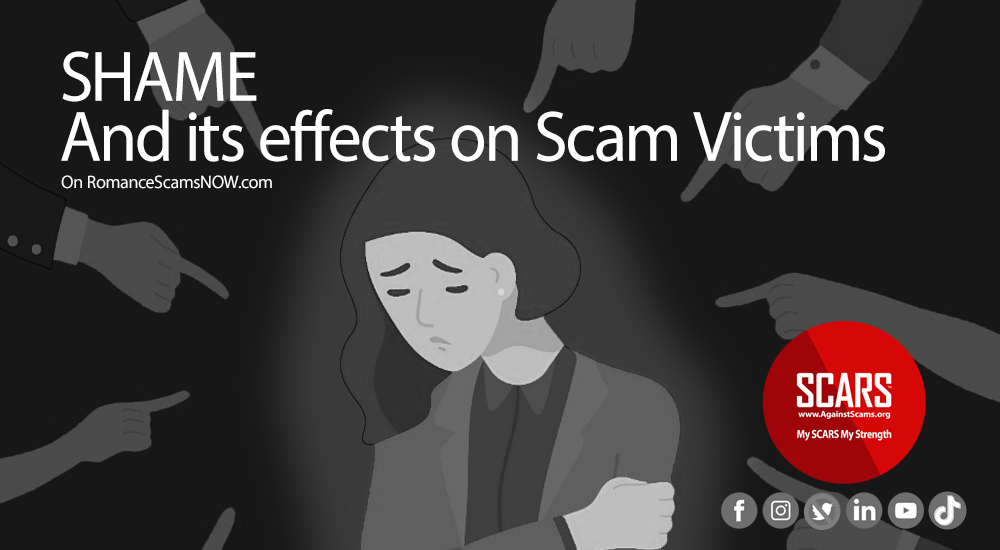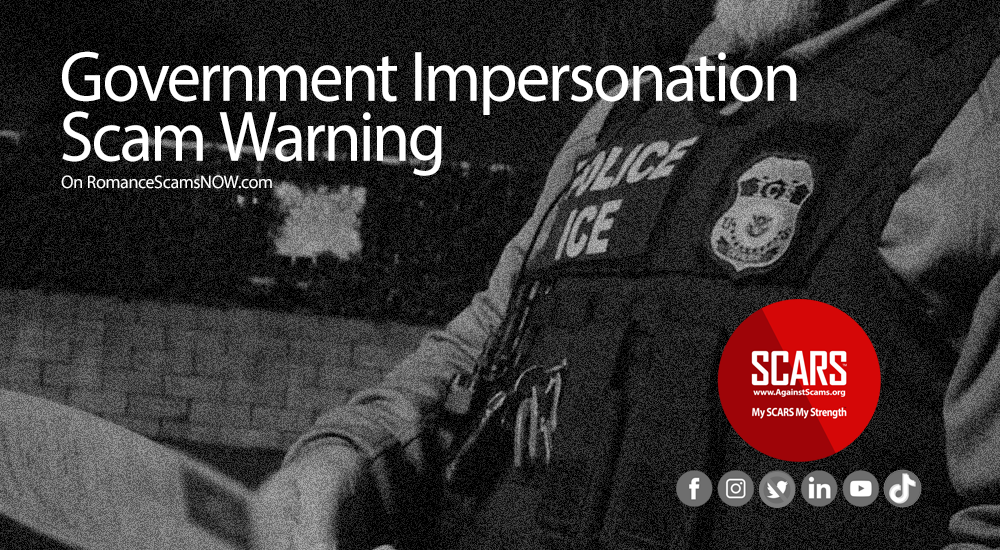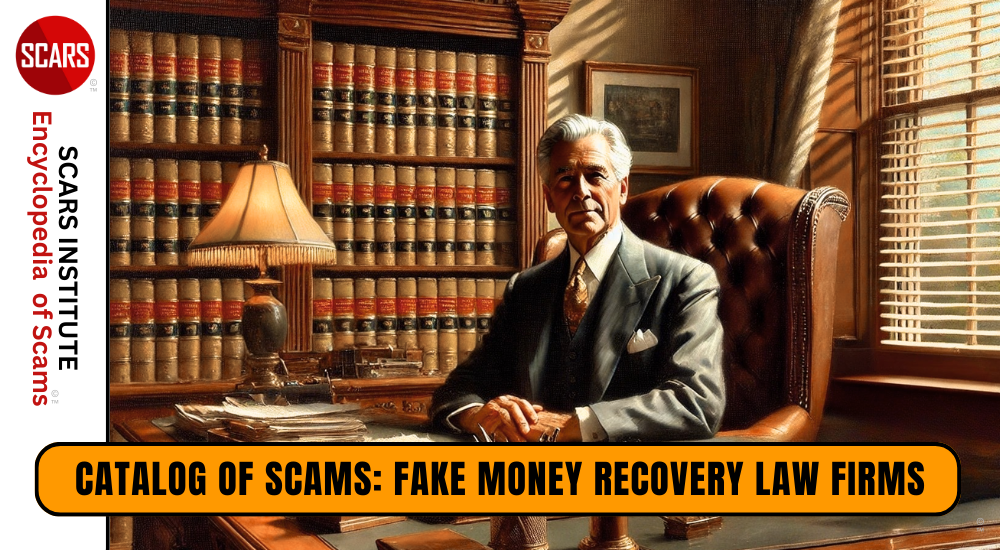
SCARS Institute’s Encyclopedia of Scams™ Published Continuously for 25 Years

Scammers Posing as Federal Court and Law Enforcement
The U.S. Attorney’s Office and the FBI have issued a new scam warning.
They are seeing renewed activity where perpetrators/scammers/fraudsters are posing as federal authorities to scare victims into sending money or cryptocurrency!
In one of the latest examples, the perpetrators emailed a letter claiming to be from a federal court about a federal criminal investigation. The letter gives the victim a choice: (1) face indictment or (2) accept an agreement as a cooperating witness, which requires $7,000 in legal fees. In addition to the letter, perpetrators also called the victim.
U.S. Attorney Sayler Fleming for the Eastern District of Missouri stated, “Scammers are always looking for ways to take your money or personal information. Anytime you are asked to pay money or give your personal information, be skeptical. Verifying the request can prevent the majority of scams.”
Special Agent in Charge Richard Quinn of the FBI St. Louis Division explained, “Scammers are using more sophisticated techniques to appear legitimate, to include using information about you gleaned from compromised online accounts, such as email or social media. Please scrutinize and verify any request for money or personal information to avoid falling prey to scammers.”
Also, scammers can easily hide their identities by displaying legitimate phone numbers on Caller ID, which is known as spoofing.
What makes this type of attack so insidious is the use of both email and follow-up calls specifically targeting know individuals. This is not the random email scams we are all used to seeing. The combination of the email and the follow-up call is much more convincing and harder for victims to recognize as a scam.
This type of scam is typically being run from India, Pakistan, and China. These attacks are targeting people who they have on your victims’ lists that may have been obtained through previous data breaches.
This is why it is important to remember these basic facts:
- No government notifies you of such situations by email – it will always be by postal mail or by a law enforcement officer visit.
- If law enforcement wants to speak to you, they might call, but only to ask you to appear at their offices.
- No government agency is going to do a deal over the phone and ask for money. If you owe the government fees, they will send a notice by postal mail, and usually, you will have to pay at a clerk of court or other government office. There are exceptions, so make sure you call the real agency by finding their phone numbers through Google.
- When you speak with any government official, ask and write down their full name, agency information, badge or other identification number, so that you can confirm or report them when you speak with the real agency.
When in doubt, please take the next step by calling the organization in question directly – but not using any number you were given on the call. Look up the phone number instead of the number given, then pick up the phone and call the agency, organization, or business to verify. Scammers will do everything, including threatening or creating a sense of urgency, to keep you from ending the call. But end the call – then confirm.
Nothing will happen to you if you end the call and call the real agency to confirm.
If you are a victim of a phone or an online scam where you wired money, immediately contact the bank you used to try to recall the wire transfer. Then file an online complaint with the FBI’s Internet Crime Complaint Center (www.IC3.gov) and the Federal Trade Commission at ReportFraud.FTC.gov or your national cybercrime police agency.
-/ 30 /-
What do you think about this?
Please share your thoughts in a comment below!
LEAVE A COMMENT?
Recent Comments
On Other Articles
- Arwyn Lautenschlager on Love Bombing And How Romance Scam Victims Are Forced To Feel: “I was love bombed to the point that I would do just about anything for the scammer(s). I was told…” Feb 11, 14:24
- on Dani Daniels (Kira Lee Orsag): Another Scammer’s Favorite: “You provide a valuable service! I wish more people knew about it!” Feb 10, 15:05
- on Danielle Delaunay/Danielle Genevieve – Stolen Identity/Stolen Photos – Impersonation Victim UPDATED 2024: “We highly recommend that you simply turn away form the scam and scammers, and focus on the development of a…” Feb 4, 19:47
- on The Art Of Deception: The Fundamental Principals Of Successful Deceptions – 2024: “I experienced many of the deceptive tactics that romance scammers use. I was told various stories of hardship and why…” Feb 4, 15:27
- on Danielle Delaunay/Danielle Genevieve – Stolen Identity/Stolen Photos – Impersonation Victim UPDATED 2024: “Yes, I’m in that exact situation also. “Danielle” has seriously scammed me for 3 years now. “She” (he) doesn’t know…” Feb 4, 14:58
- on An Essay on Justice and Money Recovery – 2026: “you are so right I accidentally clicked on online justice I signed an agreement for 12k upfront but cd only…” Feb 3, 08:16
- on The SCARS Institute Top 50 Celebrity Impersonation Scams – 2025: “Quora has had visits from scammers pretending to be Keanu Reeves and Paul McCartney in 2025 and 2026.” Jan 27, 17:45
- on Scam Victims Should Limit Their Exposure To Scam News & Scammer Photos: “I used to look at scammers photos all the time; however, I don’t feel the need to do it anymore.…” Jan 26, 23:19
- on After A Scam, No One Can Tell You How You Will React: “This article was very informative, my scams happened 5 years ago; however, l do remember several of those emotions and/or…” Jan 23, 17:17
- on Situational Awareness and How Trauma Makes Scam Victims Less Safe – 2024: “I need to be more observant and I am practicing situational awareness. I’m saving this article to remind me of…” Jan 21, 22:55
ARTICLE META
Important Information for New Scam Victims
- Please visit www.ScamVictimsSupport.org – a SCARS Website for New Scam Victims & Sextortion Victims
- Enroll in FREE SCARS Scam Survivor’s School now at www.SCARSeducation.org
- Please visit www.ScamPsychology.org – to more fully understand the psychological concepts involved in scams and scam victim recovery
If you are looking for local trauma counselors please visit counseling.AgainstScams.org or join SCARS for our counseling/therapy benefit: membership.AgainstScams.org
If you need to speak with someone now, you can dial 988 or find phone numbers for crisis hotlines all around the world here: www.opencounseling.com/suicide-hotlines
A Note About Labeling!
We often use the term ‘scam victim’ in our articles, but this is a convenience to help those searching for information in search engines like Google. It is just a convenience and has no deeper meaning. If you have come through such an experience, YOU are a Survivor! It was not your fault. You are not alone! Axios!
A Question of Trust
At the SCARS Institute, we invite you to do your own research on the topics we speak about and publish, Our team investigates the subject being discussed, especially when it comes to understanding the scam victims-survivors experience. You can do Google searches but in many cases, you will have to wade through scientific papers and studies. However, remember that biases and perspectives matter and influence the outcome. Regardless, we encourage you to explore these topics as thoroughly as you can for your own awareness.
Statement About Victim Blaming
SCARS Institute articles examine different aspects of the scam victim experience, as well as those who may have been secondary victims. This work focuses on understanding victimization through the science of victimology, including common psychological and behavioral responses. The purpose is to help victims and survivors understand why these crimes occurred, reduce shame and self-blame, strengthen recovery programs and victim opportunities, and lower the risk of future victimization.
At times, these discussions may sound uncomfortable, overwhelming, or may be mistaken for blame. They are not. Scam victims are never blamed. Our goal is to explain the mechanisms of deception and the human responses that scammers exploit, and the processes that occur after the scam ends, so victims can better understand what happened to them and why it felt convincing at the time, and what the path looks like going forward.
Articles that address the psychology, neurology, physiology, and other characteristics of scams and the victim experience recognize that all people share cognitive and emotional traits that can be manipulated under the right conditions. These characteristics are not flaws. They are normal human functions that criminals deliberately exploit. Victims typically have little awareness of these mechanisms while a scam is unfolding and a very limited ability to control them. Awareness often comes only after the harm has occurred.
By explaining these processes, these articles help victims make sense of their experiences, understand common post-scam reactions, and identify ways to protect themselves moving forward. This knowledge supports recovery by replacing confusion and self-blame with clarity, context, and self-compassion.
Additional educational material on these topics is available at ScamPsychology.org – ScamsNOW.com and other SCARS Institute websites.
Psychology Disclaimer:
All articles about psychology and the human brain on this website are for information & education only
The information provided in this article is intended for educational and self-help purposes only and should not be construed as a substitute for professional therapy or counseling.
While any self-help techniques outlined herein may be beneficial for scam victims seeking to recover from their experience and move towards recovery, it is important to consult with a qualified mental health professional before initiating any course of action. Each individual’s experience and needs are unique, and what works for one person may not be suitable for another.
Additionally, any approach may not be appropriate for individuals with certain pre-existing mental health conditions or trauma histories. It is advisable to seek guidance from a licensed therapist or counselor who can provide personalized support, guidance, and treatment tailored to your specific needs.
If you are experiencing significant distress or emotional difficulties related to a scam or other traumatic event, please consult your doctor or mental health provider for appropriate care and support.
Also read our SCARS Institute Statement about Professional Care for Scam Victims – click here to go to our ScamsNOW.com website.
















Thank you for your comment. You may receive an email to follow up. We never share your data with marketers.